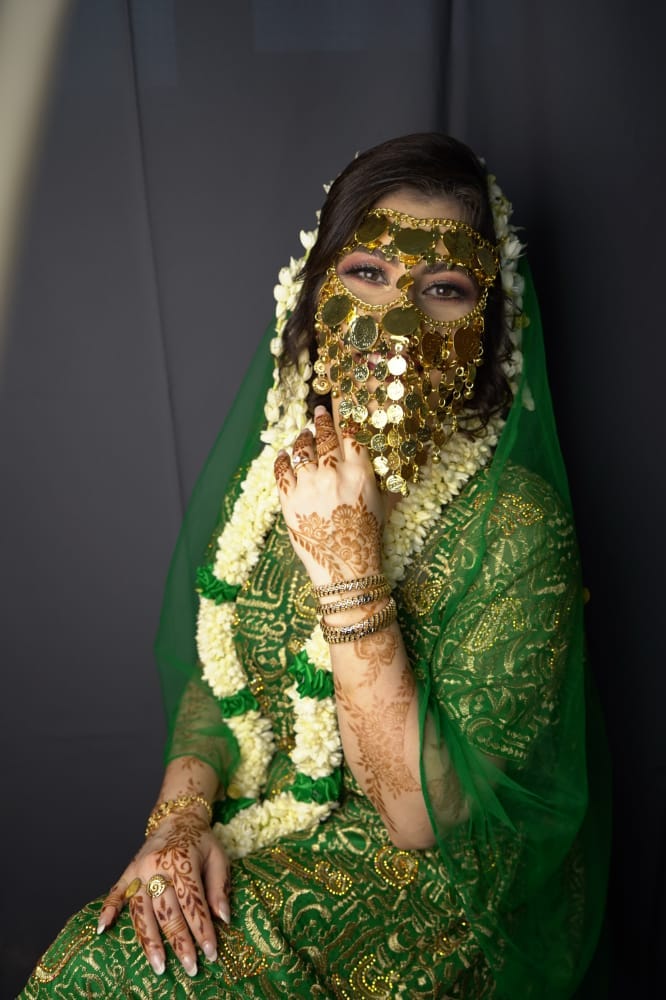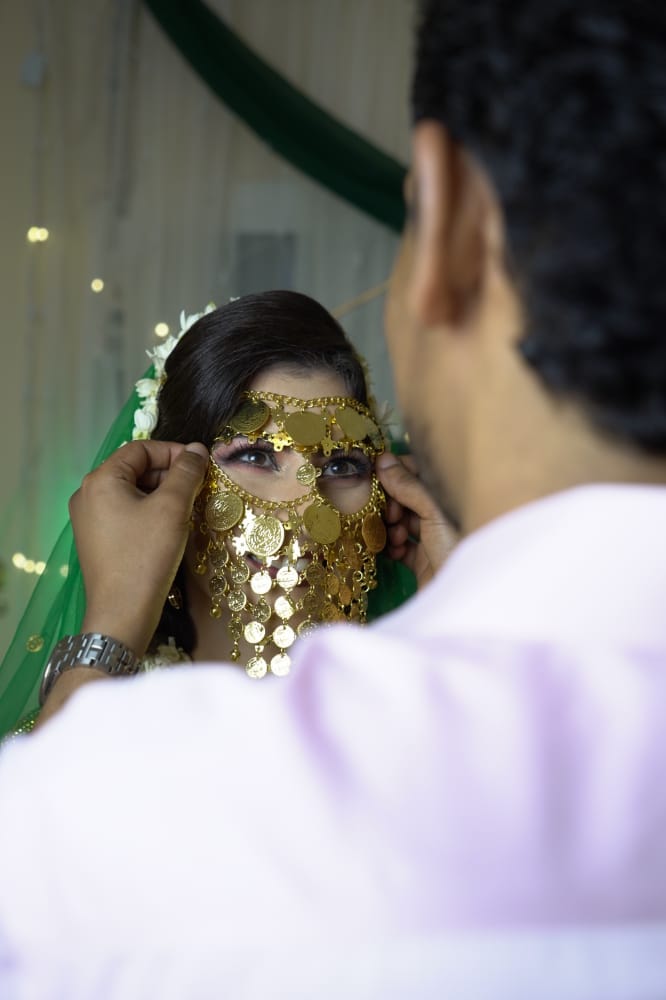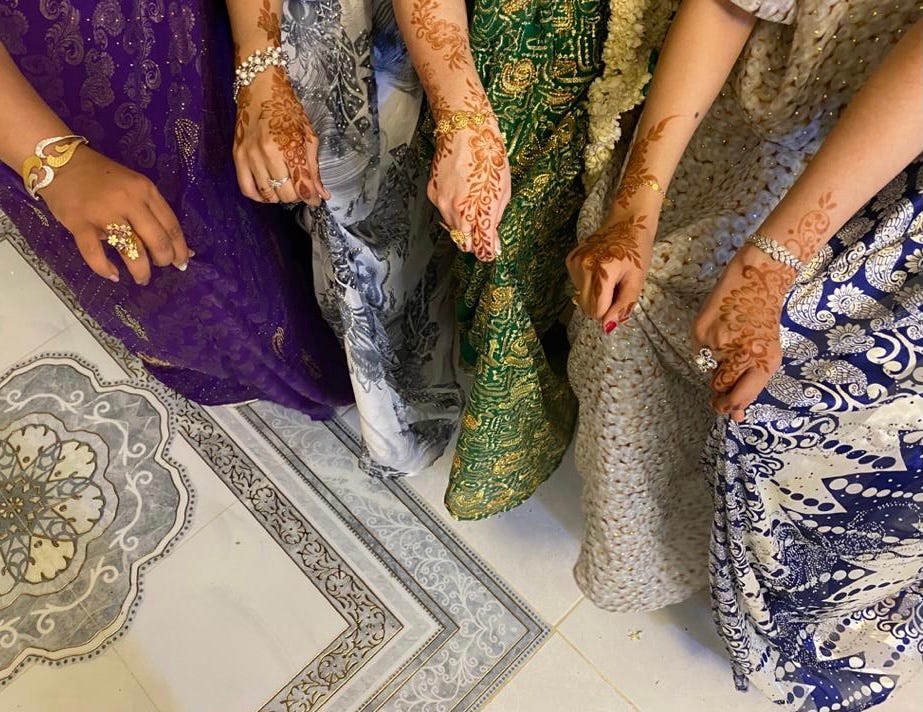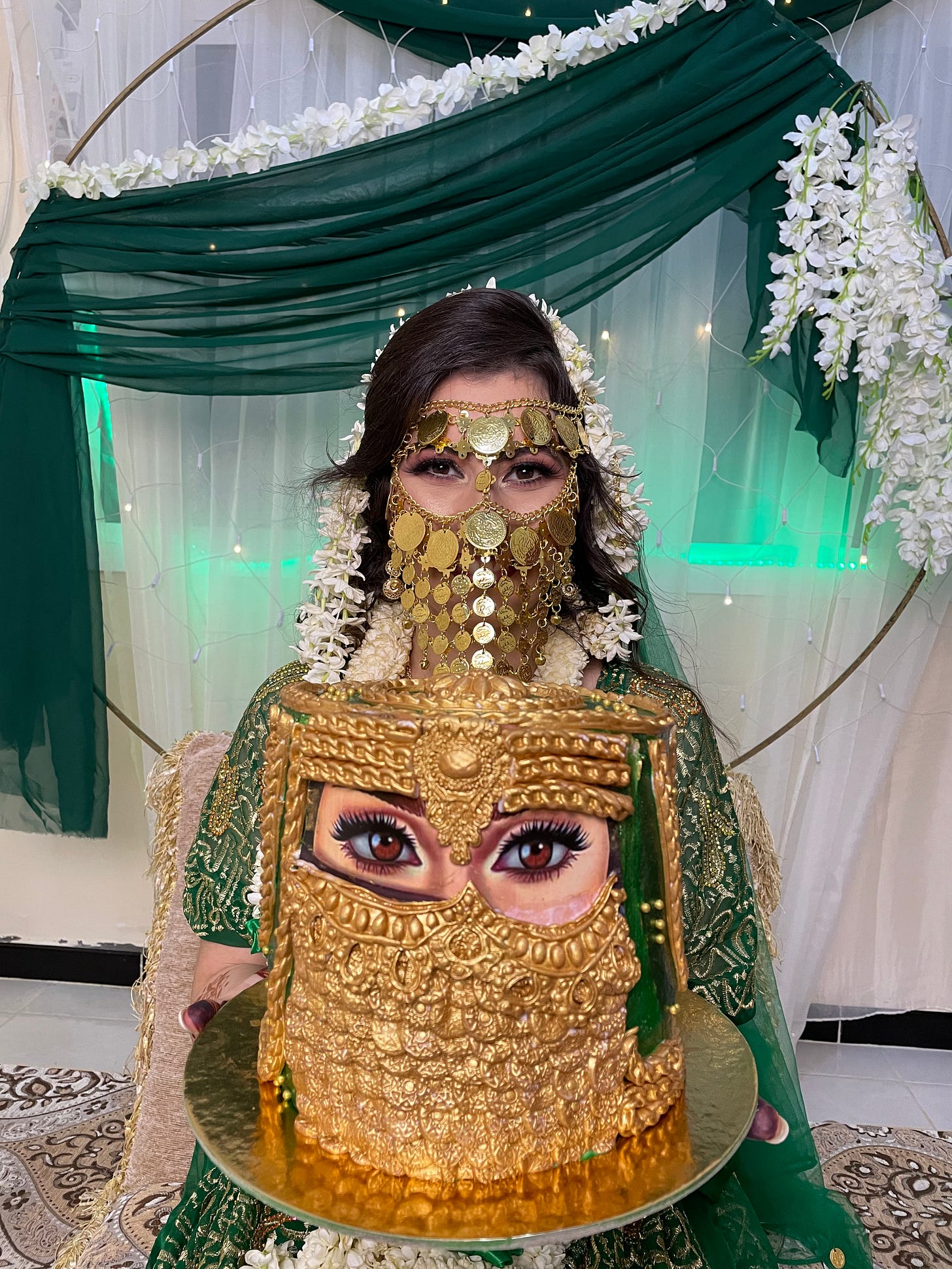In our three-day wedding celebration in Yemen in 2021, women celebrated on Thursday. The tradition of this second day says that the bride's family hosts the party, but my Argentine tribe could not make it to Yemen and Biko's family organized the celebration.
The household started preparations early in the morning. After breakfast, my mother-in-law prepared bakhur and asked me to walk with her to her bedroom. We had arrived just a few days before and so far, we had always had someone who could build a bridge between her ten-sentence English and my five-word Arabic. “This is the first time we’re going to be alone. Maybe she wants to tell me something in private. But how are we going to communicate?” I was a bundle of nerves as we walked away from the dining room and left the family's voices behind. (Un)justified nerves? I’ll let you decide.
She closed the bedroom door behind us and with a kind hand gesture asked me to sit on the small armchair. She left the bakhur on the floor and put a cone-shaped cane structure on top to guide the smoke of the bakhur to the sides and up. One by one she took the dresses the women in the family would wear that evening and carefully arranged them on top of the cane cone, creating a colorful and bright mountain of fabrics. The woody and elegant fragrance of the bakhur began to perfume the dresses and soothe my nerves. Her pace was slow but confident, and her aplomb made it feel so pleasant to be in her room.
She then walked to the closet and got three jars. She opened the first one, rubbed her hands with what looked like oil, and massaged one of my arms first and then the other. She opened the second jar, and a floral smell filled the room. She rubbed her fingers together and gently put the perfume behind my ears. She opened the third and final jar. This time the consistency was not oily, but more like a wax with a scent that, to this day, I can’t identify. With patience, she softened and perfumed my rebel curls. She turned to face me, looked me in the eyes, and slightly nodded with a smile. “You're ready,” her eyes said without the need for words.
She opened the bedroom door and the noise of the house, exhilarated with preparations, pierced the silence of the room. I wished our time alone would have lasted longer, but I was also excited for the busy day ahead. The men had vanished from the scene and the women were coordinating tasks. Their voices were cheerful, and it didn’t matter to me that I couldn’t understand the long conversations in Arabic. Being immersed in such exclusively female intimacy so far away from home felt like a privilege, a rare invitation very few people get.
Two young women arrived early in the afternoon and displayed combs of all sizes, lipsticks in all shades, and eye shadows of all colors. This was the second time that I was a witness to the transforming power of the Yemeni hands. On Sunday the musicians had turned the street into a celebration venue under the stars. Now, the make-up and hair artists had turned my mother-in-law’s bedroom into a salon. It was unsurprising when after two hours I didn’t recognize myself in the mirror. The glitter they used may as well have been fairy powder, who knows?

The groom didn’t recognize me either. “Where’s the Argentinian girl I brought on the plane with me?” he asked and kissed my forehead. He had come upstairs to see me before the guests arrived. The party would take place in the big room downstairs, and the privacy of the house would allow all women to parade their party dresses and show off their dance moves without the male gaze.

It was finally time and my mother- and sisters-in-law escorted me to the staircase. When I took the first step, I realized no one had explained what I had to do. I could see the group of women at the end of the stairs, so now it was too late to stop to ask. I knew we were celebrating, but how do women celebrate a wedding in Yemen? When I got to the last step I doubted if I should greet them with a kiss, like I had learned women greet each other multiple times on the same cheek when I arrived. But they were more than 40 and I let the idea go.
The loud zaghrouta1 that women usually do at weddings cleared my nerves, fears, and doubts. The younger women surrounded me in a semi-circle and walked me to a special seat at one end of the room. “It’s like a throne,” I thought. The older women sat at the other end of the room, away from the music coming out of the large speakers so they could chat. This time, there was no need for a band, or a singer, or dancers. My nieces had prepared a song list with all-time favorites and modern Egyptian songs the older generations disapprove of and the younger ones play non-stop.2 The younger women had me sit on the throne(?), although I was not seated for long. They expressed their good wishes, did some more zaghroutas and invited me to dance. The fun had started.
I was astonished by their moves, very different from the simple dance the men do and that I had found so easy before. The cumbia moves from my teenage years would clearly not be helpful this time. These women were sensual, sweet, and joyful, conveying a perfect balance of emotions with every single move. They would try to teach me new dance moves with every new song, but I failed to imitate them.

I’m now reading a book about an Argentinian living in Sweden, and she is learning how to skate on ice. She says she thought she would feel bad if she compared herself to all her highly skilled skating friends. But seeing them sliding on the ice she had the happy certainty that they were from the same species, and anything they did, she could do too. They just had years of advantage doing ice-skating, of course, and that was ok with her. Virginia Higa3, the author, puts into words my feelings of that Thursday afternoon in Aden, when I simply allowed myself to enjoy and admire the beauty of those women’s dance.
This second celebration was one of my most special days in Yemen. Since the preparations early in the morning until the last song of the night, I was surrounded by sisters, mothers, aunts, and friends. None of them spoke Spanish, my mother tongue, and it is possible most of them didn’t know where Argentina was. Fair, I had learned where Yemen was not long ago and, that night, I didn’t even know how women celebrated weddings. However, the cultural, geographical, and linguistic barriers vanished in the face of the affection and sincere wishes of happiness of that group of Yemeni women for the foreign bride, who had traveled thousands of miles to celebrate love with them.

»I’d love to hear from you and you can always reply to this email directly so we can connect. 🙂
»If you’ve enjoyed this story, you can share it with others who you think might enjoy it too.
»If you haven’t subscribed yet, and would like to read more about my trip to Yemen, you can subscribe below. I share a new story every other weekend.
Thank you for reading me today.
Until the next story!
Pia
✨Zaghrouta is a high-pitched howl that women do in celebrations, especially at weddings. They make the sound by moving their tongue and I still need a lot of practice to be able to do it. One day, I’ll do a great zaghrouta, inshallah. But for now, I enjoy listening to others, like this amazing woman. Don’t miss her 12-second video. What about you? Can you do it?
🎶This was my favorite song of the night. Hassan Shakosh and Omar Kamal are Egyptian artists, and I can’t help but dance every time I listen to their songs.
Virginia Higa is an Argentinian author and I love her work. Unfortunately, her books have not been translated into English yet.
📚If you read Spanish, here’s the book I mentioned in the post. It’s a great collection of essays about her experience living in Sweden.
📚If you read French, here’s the link to her first novel available in French.




Pia- This is a breathtaking window into the intricate respect of the cloth and as you say: "mountain of fabric." What I appreciate the most is the beautiful way you took the reader through the journey up to the finish point--complete with the visual of the eyes, windows to the soul, surrounded by everything golden and bright. What a delightful read. Hope you're well this week? Cheers, -Thalia